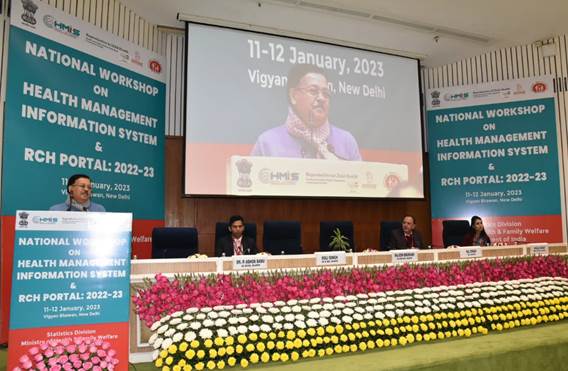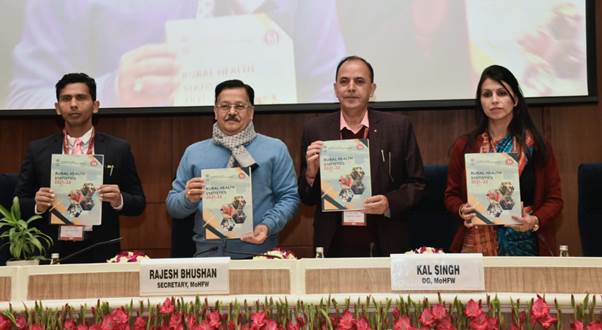Union Ministry for Health & Family Welfare organizes a two-day National Workshop on Health Management Information System (HMIS) and Reproductive Child Health (RCH) Portal
“I congratulate the unsung heroes of our health sector, the field workers, data gatherers, data integrators and data managers etc. They have made crucial contribution in timely data generation from over 2.25 lakh health facilities spread across the country. This data needs to be analyzed on a real-time basis to serve as the basis for health interventions in the states.” This was stated by Union Health Secretary Shri Rajesh Bhushan while addressing the National Workshop on Health Management Information System (HMIS) and Reproductive Child Health (RCH) Portal here at Vigyan Bhawan, New Delhi today.
The objective of the two-day workshop was to reiterate utility of Health Management Information System (HMIS) portal and Reproductive Child Health (RCH) portal and their use as a monitoring and policy intervention tool. Three publications were released at the event along with focus on digital interventions under Ayushman Bharat Digital Mission (ABDM). New features of ANMOL (ANM Online), Kilkari Mobile Academy were also showcased.

Speaking on the occasion, Union Health Secretary drew attention to the major developments happening in health sector over the past few past years. He noted that “across the country, more than 1.54 lakh Health and Wellness Centres (HWCs) have been operationalized. Along with offering 12 health packages free of cost, they also provide free drugs and diagnostics, free screening tests for common Cancers, Diabetes and Hypertension. Over one lakh HWCs are offering e-Sanjeevani Teleservices too.” “This is leading to generation of huge amount of digital data, which we need to ensure are uploaded and analyzed carefully”, he further added.

Focusing on another development of Ayushman Bharat Digital Mission (ABDM), Shri Rajesh Bhushan said that “we need to have greater harmony among RCH, HMIS portals and ABDM. Creation of longitudinal health records and interoperability is being ensured through creation of ABHA IDs. These can be linked with RCH and HMIS which can act as a gamechanger in health sector.” He further emphasized that “all health facilities are in a position to generate these ABHA IDs and link them to digital health records. Consequentially, this will create a robust ecosystem of paperless and hassle-free access to digital health records for our citizens.”
Union Health Secretary released three publications. These include the Rural Health Statistics 2021-22, an annual publication of MoHFW since the year 1992. This provides the data on health infrastructure including manpower up to 31st March of every year. The publication is based on the data uploaded by States/UTs on HMIS portal and published only after getting verified by respective States/UTs. It would serve as a vision document in identifying the gaps in the existing Healthcare Infrastructure and Human Resources in rural, urban and tribal areas of the country. It will serve as an important source of information for citizens too.
The other report released today is HMIS 2020-21 & 2021-22 report. It provides an analytical insight into the key performance indicators pertaining to maternal health, child health, immunization, coverage of family planning services, adolescent health, and patient services. In addition, an analytical chapter has been specifically incorporated to analyze the performance of District hospitals during these two years based on bed occupancy rate, C-Section rate, Blood replacement rate, rate of early initiation of breast-feeding, post-surgical infection rate etc.
Compendium of PRCs 2021-22 titled “Health for All: Prospects and Issues” was also unveiled today. The compendium contains selected research studies based on the primary as well as secondary data on Maternal Health, Child Health, Family Planning, Non-communicable diseases (NCDs) & communicable diseases (CDs) etc conducted by PRCs during the year 2021-22. Awards were given to PRC Srinagar, PRC Dharwad, PRC Kerala, PRC Bangalore for their respective research studies.
Dr. P Ashok Babu, Joint Secretary MoHFW, Shri Kal Singh, Director General, Ms. Anjali Rawat, Deputy Director General MoHFW were present at event. The workshop was also attended by HMIS and RCH nodal officers from States/UTs, Programme Divisions of Ministry, development partners and other stakeholders.

